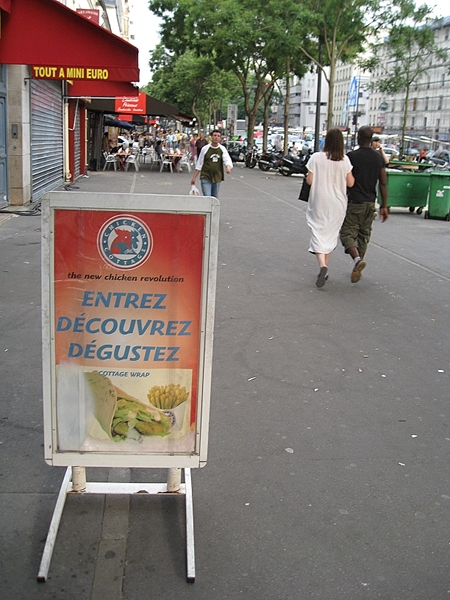
There is currently a public debate in Germany about what to do with long-term unemployed or similarily precarious individua. In particular in Germany there exists a social care instrument called “Hartz IV” which combines unemployment benefits and welfare benefits. The debate saw meanwhile quite some contraversial statements, including a statement by the current minister for foreign affairs Mr. Westerwelle, who warned -according to Spiegel-Online in that context of “late-roman decadence” and – again according to spiegel-online demanded that recipients of Hartz IV who do not display enough flexibility should be further sanctioned (there are already sanctions). One of his main ideas which stood behind these statements was – if I understood correctly that “work should be worthwhile again” . In particular it was inferred in that context that some recipients of Hartz IV receive more benefits than some who work full-time in a badly paid job. Meanwhile people tried to collect information about which assertions are correct in that context. Like there was a nice (partially even tabularized comparision) about benefits and unemployment in Berliner Zeitung (unfortunately I currently cant find the link) which displayed that less benefits do not automatically increase job chances. Likewise Frederic Valin of the Berlin blog Spreeblick collected some arguments, which disagree with some common buzz-terms which were used by some politicians, others provided examples where working (in contrast to receiving benefits) would not pay out a.s.o. The debate had now been even more spurred by the SPD top-candidate for the federal state of Nordrhein-Westfalen Hannelore Kraft who suggested –according to Spiegel Online – that recipients of Hartz IV may have at least some kind of job if they could work in places which are oriented to the public good like in care for the elderly etc. These recipients could then earn a little more money than the usual Hartz IV money, which is 359 Euros a month. The main idea behind that proposal being probably that this would relief recipients of Hartz IV from the feeling of being some kind of public “parasites”.
In all the discussion I somehow missed out something, so I felt I had to explain this here on the blog.
Guido Westerwelle’s idea that “work should be worthwhile again” will here actually also be the key issue in my arguments. The question how to find a measure for what is “worthwhile”, independent of market mechanisms will be at the center.
I do not agree with Mr. Westerwelle that people who do not display enough flexibility should be further sanctioned. I do not understand how he might have drawn his conclusions from the idea “work should be worthwhile again” and I will try to explain this. (Apart from what I am going to say it should be inferred that the quest to lower benefits seem to have its flaws already by “free-capitalistic” standards, because if you would reduce or cut the current benefits then the low-paid labour market would be flooded and thus low-paid work (in Germany there is usually no minimum wage) would be even less worthwhile.)
There had also been already quite some discussion here in Germany about a basic income for everybody. This discussion is of course not limited to Germany and there are other suggestions for innovating reimbursement like for example Jeremy Rifkin talks in this interview (mentioned in the comment section of Valins post) about the use of time-dollars a.s.o. I think time-dollars may make sense only in very special circumstances and the argument against them is again related to the question when “work is worthwhile again.”
Before coming back to the discussion about the value of work, one has to digress a bit.
The “world market” would in a simplified picture basically consist of three main ingrediences: ressources (I consider machines to be ressources for simplicity), the labour market and the financial/partially entrepreneurial sector. In the labour market one gets money for labour and in the financial/partially entrepreneurial sector the money is again very simply speaking mainly made by providing the “fluidity” (i.e. e.g. by distributing investments, transfer actions), by handling risks and responsibility (like for example for the workers).
Labour is usually paid according to availability of the needed work force (the market).
Now one observes the following: The labour market is in decline. It is first in decline with repect to the overall production, mainly due to rationalization but secondly it is in decline with repect to the financial sector. For the first assertion I have spend quite some time to gather actual data in the past days, whereas the second assertion will be left unproven.
side remark I:
Data for the assertion that the labour market is in decline: In the already mentioned interview Jeremy Rifkin gives some data for the decline in employment (and in fact he wrote a whole book about it) and there are others (some are e.g. listed in the german Wikipedia). In fact the issue of “machines killing labour” is old enough that as a kid I imagined that when I would be an adult I wouldn’t need to work anymore. This situation is not yet there (and its very debatable wether it will be like that) but there are meanwhile rather clear indications that the overall trend of rationalization is killing jobs is true. I didn’t read Rifkins book and there is probably enough data in that book, but there is also public accessible information in the internet. That is the International Labour organization ILO hosts at laborsta quite an amount of data, however this data has only very partially been analysed. I actually even corresponded with the ILO and it seems one of the best available statistical ressources which display the long-term decline of employment is given in this document. Here the socalled elasticity is listed over 4-year periods starting from 1992 and ending in 2008 (Box 19b). The elasticity is calculated by dividing the observed growth rate of employment during any past period by the observed growth rate of GDP during the same past period. That is for example if the amount of people having an employment would be growing by a factor of 0.02 and the world-wide GDP would be growing by a factor of 0.06 in four years then the elasticity would be about 0.3 as it is given in the table. In other words if the GDP wouldn’t grow one could assume that the employment would be in rather rapid decline. Similar things can be deduced by looking at the productivity (see productivity at KILM) which seems to have been growing in the same order of magnitude on a first glance (unfortunately here there seem to exist no worldwide analysis).
Hence as a consequence of the above the money which used to be in the labour market goes either into the financial sector or into ressources ( i.e. simplified into machines). There is also quite some labour going into “information production”, which could also be seen as going into ressources, however it should be noted that here the issue of its easy duplication has to be considered.
As a consequence Rifkin proposed e.g. in his interview to establish a tax on machines.
side remark II:
There is also a trend to delegate the original entrepreneurial risk to labour force. See for example outsourcing of the job market for software development (see e.g. this or this company) This happens even on the academic market and not only on the teaching side (see e.g. this randform post) but also on the research side -where it should be pointed out that especially special types of research are a high-risk undertaking (see e.g. this company, which is supported by one of the most prestigious scientific journals).
By looking at these trends (it would be of course helpful to have more data accessible and more data analysis at hand than the above one currently provided by ILO) one sees that unemployment is rather not due to “lazy parasites” which should be seen in connection with “late-roman decadence” but rather due to a world-wide rationalization.
Sofar there seems to be no easy recipe how to adress the above problems and maybe – at least for a certain time there can be only smaller steps applied (like maybe the above mentioned taxation on machines). However I think it is necessary to rethink the paradigm of work in general, which brings us back to the original question of when is “work worthwhile”. In particular it is also clear by the above that the old labour market mechanisms do not work anymore as they used to. There will be more and more people without labour and if there is no welfare these people will be without income.
As a consequence it will be important to understand what work means and why and when “work is worthwhile”. And as I tried to explain above it is worthwhile to understand this independently of current market mechanisms.
In particular the usual “parasite” reproach towards unemployed presupposes that work is something “unpleasant”. Paradoxically it is however NOT SO THAT THE MOST UNPLEASANT JOBS ARE THE BEST PAID JOBS! On the contrary, not so pleasant jobs like cleaning public toilets are rather lousy paid!
Thus if one would assume that employment would decline to such an extent that unemployment/welfare benefits would be needed to be paid to a great percentage of the poulation, i.e. if one would be in a situation, where one would have a quasi basic income, then it is indeed an interesting question, who would do the unpleasant jobs in that context.
Hence for simplicity assume all of the population receives a basic income. My claim is that in this context it is important to find out what is not pleasant/especially strenous at a job and to have a public debate about that. In particular in that context “work could be seen worthwhile again” if the unpleasant parts are adequately honoured. If these unpleasant parts would be honoured adequately then there would still be enough people doing “unpleasant” jobs, in particular those which can’t be done by machines (why not clean the toilets of Bahnhof Zoo for a month stay in a villa at an italian lake?). The time dollar is only very limited capable to capture the unpleasantness of certain jobs. It is by the way also not easy to assess creative work with a time-dollar. This reassessment of the value of work however would probably also imply that rather pleasant jobs may be paid rather poorly.
It is of course not easy to assess, what is unpleasant and what not, in particular skills, personal preferences and mentality play an important role in here. Everybody who knows the fights about who does what in a household will agree. But as already said it would be interesting to have a public debate about this. This could give interesting insights into wether the payment for example for some “one Euro jobs” (or similar proposals like the one of Mrs. Kraft) in the public sector are adequate. For me it would also be interesting to discuss wether grading math assignments (which is not pleasant) is really more than 12 times less unpleasant than being a bank director, assuming that the skills are comparable.
